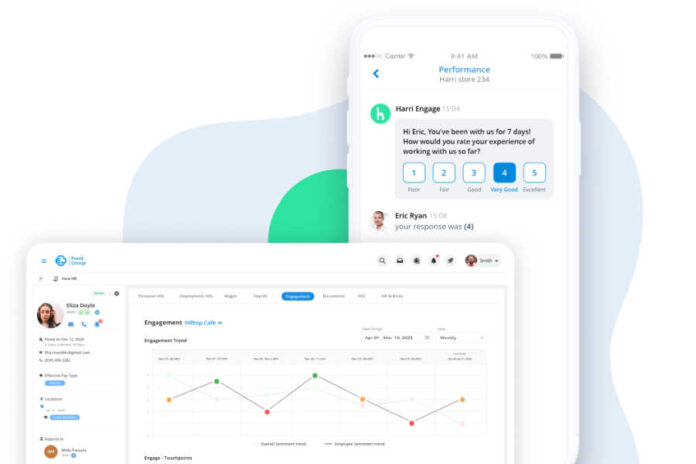
Frontline experience platform Harri rolled out Harri Engage, a new product to help service businesses improve employee engagement and retention.
Developed in partnership Harri customers, Engage aims to make it easier to improve engagement while providing analysis that can be used to change an employer’s approach when necessary.
“We designed Harri Engage with automation and intelligence at the core, making it incredibly simple to foster connection and support for frontline employees so they feel valued,” said Harri CEO Luke Fryer.
Embedded in Harri’s suite of solutions, Engage leverages touchpoints when employees clock in, enabling 100% adoption, Harri said. Touchpoints are also found within the mobile app already used for scheduling, swapping shifts or connecting with team members. Sentiment and feedback are summarized via dashboards and reports.
Soon, Harri plans to extend its platform’s existing conversational AI capabilities to work through the entire employee journey, from job application through departure. In early 2024, Harri Engage will use AI to leverage the feedback it already collects.
Ripe for Opportunity
Focusing on engagement and retention makes perfect sense when your customers are particularly prone to their consequences. Harri says hospitality businesses face turnover rates that are five times higher than industry-wide averages, with annual turnover ranging
between 70% and 80%. Making things worse: A large proportion of frontline workers quit their jobs before 90 days from their hire.
On top of that, hiring for frontline workers has not normalized since Covid-19, according to research from Fountain. Frontline industries listed 25% more job openings in July 2023 than they did in July 2019, the company said. Meantime, quit rates have risen to their highest levels since the pandemic.
The dynamics of the frontline workforce have also changed, observed Fountain CEO Sean Behr. Workers now have more options, more flexibility and receive generally better treatment. As a result, “they have more power and ability to effect change at their current companies, which we are seeing playing out across industries,” he said.
In October, Harri closed a $43 million Series B round. The company said it would use the funds for product development, growth efforts and scaling in response to market demand.
Image: Harri













